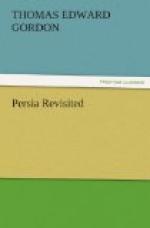[Footnote: A: Since the above was written, information has been received that the late Shah, about three weeks before his death, promulgated a decree directing the Mint coinage of copper to be suspended for a term of five years, and intimating that the Customs, Post-office and Telegraph departments would accept copper coin to a certain amount in cash transactions, at a fixed rate. And, further, arrangements have been made with the Imperial Bank of Persia to purchase, on account of the Government, copper coin up to a certain sum, from small bona-fide holders who are in possession of it in the regular course of retail business for the necessaries of life.]
CHAPTER IV.
—Religious tolerance in Tehran —Katie Greenfield’s case —Babi sect —Liberal opinions —German enterprise in Persia —Railways in Asia Minor —Russian road extension —Railways to Persian frontiers —The Karun River —Trade development —The Kajar dynasty —Life titles —Chieftainship of tribes —Sanctuary —The Pearl cannon.
The late Shah was always liberal and conciliatory in the treatment of his Christian subjects throughout the country, and this is a matter which, at the present time, deserves special notice. In the history of Persia many proofs of friendly feeling towards Christians are to be found, and the sovereigns appear to have led the popular mind in the way of goodwill to them. Shah Abbas the Great was an example of kind and considerate tolerance, and it was Shah Abbas II who said of them, ’It is for God, not for me to judge of men’s consciences: and I will never interfere with what belongs to the tribunal of the Great Creator and Lord of the universe.’ The Western Christian missionaries are fully protected in their mission work among the Eastern Christians in Persia on the understanding that they do not actively and directly engage in proselytizing Mohammedans.




